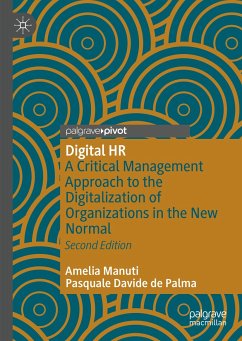With a particular focus on Human Resource Management (HRM), the authors analyse the socio-cultural transformation of traditional practices and methodologies that are occurring in the workforce. Digital HR presents detailed case studies and interviews with HR managers of large multinational companies, providing comprehensive empirical evidence for academics and students interested in the development of HRM in today's digital landscape. The book will also be valuable to practitioners and managers looking to adapt the role of HR in their own companies or organizations.
Amelia Manuti is a Full Professor in Work and Organizational Psychology at the University of Bari, Italy where she teaches Psychology of Organizational Behaviour and Career Management and Organizational Development. She has written several articles and co-edited books including Why Human Capital is Important for Organizations and The Social Organization (Palgrave Macmillan, 2014 and 2016).
Pasquale Davide de Palma is an expert in Industrial and Organizational Psychology from Italy. He holds a degree from the University of Bari and is known for his pioneering work in social recruiting, social human capital and people analytics. He recognized the significance of social networks in talent acquisition and emphasized the importance of social relationships within organizations for enhanced performance. He has co-edited influential books on human capital and is the Founder of HrCoffee,a consulting firm that helps organizations optimize their human capital strategies and implement effective people analytics practices.
Dieser Download kann aus rechtlichen Gründen nur mit Rechnungsadresse in A, B, BG, CY, CZ, D, DK, EW, E, FIN, F, GR, HR, H, IRL, I, LT, L, LR, M, NL, PL, P, R, S, SLO, SK ausgeliefert werden.









